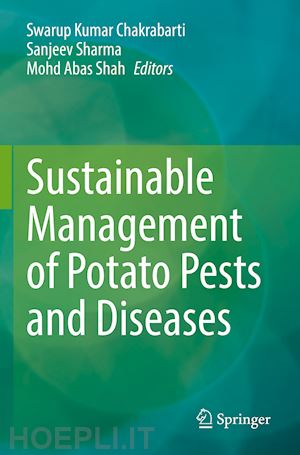

Questo prodotto usufruisce delle SPEDIZIONI GRATIS
selezionando l'opzione Corriere Veloce in fase di ordine.
Pagabile anche con Carta della cultura giovani e del merito, 18App Bonus Cultura e Carta del Docente
This book covers the important diseases and pests of potato which are of global significance. The pests and diseases in potato lead to huge economic losses by reducing the yield and quality of the produce. This book describes major pests and diseases in detail with particular emphasis on the latest developments with respect to their biology, ecology, and management. It highlights the importance of virus infection for seed potato production and diagnostic symptoms, along with management guidelines. The book brings forth tips for judicious use of pesticides for sustainable potato production and management of pesticide resistance. Use of novel approaches such as RNA interference, genome editing, and other genomic resources for drug designing in diseases and pest management is also emphasized in the book. This book is of interest to teachers, researchers, extension workers, potato growers, and policy makers. Also, the book serves as additional reading material for undergraduate and graduate students of agriculture and plant pathology. National and international agricultural scientists and policy makers will also find this to be a useful read.
Dr. Swarup Kumar Chakrabarti is the Vice-Chancellor of Uttar Banga Krishi Viswavidyalaya, Pundibari, Cooch Behar, West Bengal. Earlier, he served as Director of ICAR-Central Potato Research Institute, Shimla (Himachal Pradesh), and ICAR-Central Tuber Crops Research Institute, Thiruvananthapuram (Kerala). He obtained his doctorate from ICAR-Indian Agricultural Research Institute, New Delhi, in Plant Pathology and Postdocs from Waksman Institute, Rutgers, USA, and CIRAD-AMIS, IGEPAM, France. He is a renowned scientist in the areas of molecular plant pathology, plant disease diagnostics, and structural and functional genomics of potato. He published more than 200 peer-reviewed publications and is the recipient of several awards and recognitions.
Dr. Sanjeev Sharma is principal scientist at ICAR-Central Potato Research Institute, Shimla (Himachal Pradesh). He specializes in population biology, epidemiology, and management of potato pathogens, Phytophthora infestans in particular. He was part of the team that developed the pan-India late blight forecasting model “IndoBlightCast.” Dr. Sharma was honoured with ICAR Research Award for Outstanding Interdisciplinary Research (2015–16), New Delhi; besides numerous other awards. Dr. Sharma has over 150 research papers, book chapters, review papers, and technical bulletins to his credit. He represented India at various international fora pertaining to late blight of potato.
Dr. Mohd Abas Shah is scientist at ICAR-Central Institute of Temperate Horticulture, Srinagar, Jammu and Kashmir. Earlier he served in the capacity of scientist at ICAR-Central Potato Research Institute-Regional Station, Jalandhar (Punjab) where he worked on the population biology, ecology, and management of sweet potato whitefly (Bemisia tabaci), the potato aphids, and the viruses they transmit in potato crops. He has more than 30 peer-reviewed publications of national and international repute. He was awarded with best paper award from the Indian Potato Association, Shimla, besides various best poster awards and a gold medal for outstanding doctoral research from SKUAST-Kashmir.











Il sito utilizza cookie ed altri strumenti di tracciamento che raccolgono informazioni dal dispositivo dell’utente. Oltre ai cookie tecnici ed analitici aggregati, strettamente necessari per il funzionamento di questo sito web, previo consenso dell’utente possono essere installati cookie di profilazione e marketing e cookie dei social media. Cliccando su “Accetto tutti i cookie” saranno attivate tutte le categorie di cookie. Per accettare solo deterninate categorie di cookie, cliccare invece su “Impostazioni cookie”. Chiudendo il banner o continuando a navigare saranno installati solo cookie tecnici. Per maggiori dettagli, consultare la Cookie Policy.